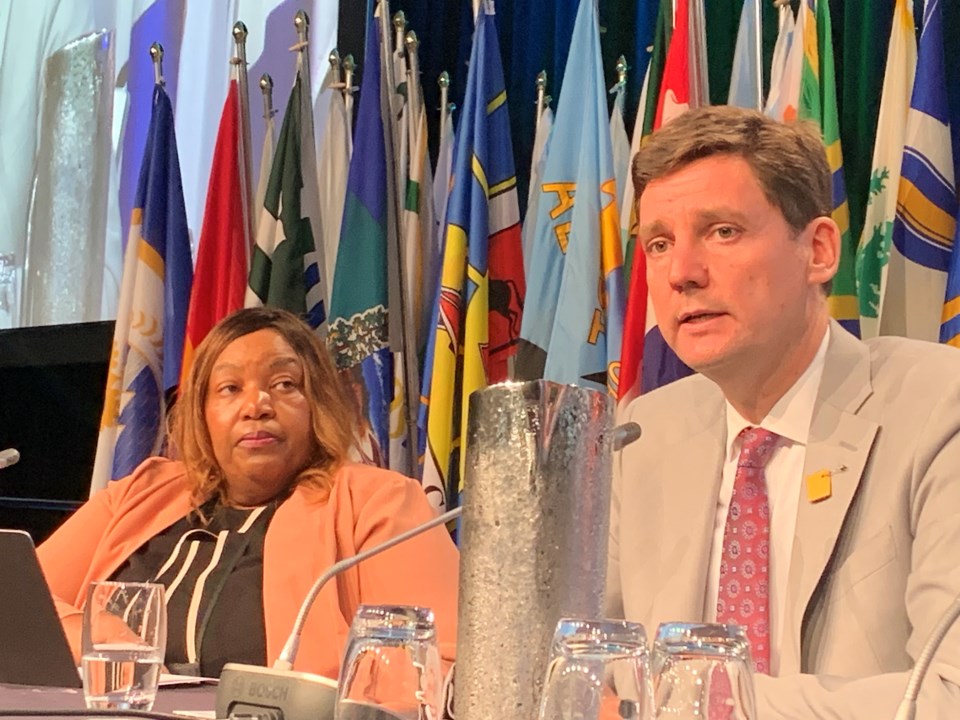Premier David Eby kicked off the provincial general election campaign Sept. 19 before the writ drops in promising improved resources for health and addiction care, police protection for downtown cores and a review to the 911 emergency call system.
The NDP leader made the pledges Sept. 19 as he gave the premier’s traditional address at the Union of B.C. Municipalities’ (UBCM) annual general meeting in Vancouver.
The premier received a standing ovation when he entered the convention hall for his speech, which was followed by a question-and answer session hosted by UBCM president Trish Mandewo.
Several times, Eby took aim at the Conservative Party of BC, the challengers to form government after BC United under Leader Kevin Falcon suspended his party's election campaign.
Eby started by recognizing both British Columbians and local communities have felt the strings on their pocketbooks tighten due to global economic stresses.
But, he said, the province is facing population growth, which means health care and infrastructure such as roads, hospitals and transportation need to be improved instead of cut.
“We've got to be hiring those health care workers, not firing them — not cutting health care budgets, [and] building those hospitals, not closing them,” Eby said.
“As premier and as leader of one of the parties going into the election, my commitment to you is that we need to keep working together. We’re not going to be looking away from the challenges that you face.”
Emergency call centre
Addressing a UBCM resolution, Eby promised an independent review of the E-Comm 911 system's governance model and financial structure.
The system is the first point of contact for 911 in B.C.’s 25 regional districts, handling over two million 911 calls a year.
It also provides dispatch services for police and fire departments and operates the largest multi鈥恓urisdictional, wide鈥恆rea radio network in the province used by police, fire and ambulance personnel throughout Metro Vancouver and parts of the Fraser Valley.
Housing
The premier said housing remains a central issue as British Columbians consider how they will mark their ballot next month.
He tipped his hat to Kelowna for having had record housing starts and for identifying land for social housing.
“We’ve added more housing per capital than any other province in the past seven years,” Eby said. “While rents in Canada are going up, rents in B.C. are down — finally.”
Further, he said another 300,000 housing units are expected to be added to the province’s supply over the next decade.
“It’s one of the biggest issues and challenges we face in the province,” he said, noting how housing is connected to health care, homelessness, street disorder and the ability for communities to grow.
Health care
Communities throughout the province have been dealing with cuts to emergency room services, including closures for periods of time.
He said cuts suggested by the Conservatives “will not keep your emergency rooms open.”
He said the NDP would provide incentives other than get health care providers to under-serviced areas.
“We will make sure every single person in British Columbia has access to a family doctor,” he said.
Drug crisis and safe streets
Eby and the NDP have already begun the process of involuntary care for heavily addicted drug users, which are called secure care by some.
He said Surrey Pre-Trial Centre and the Alouette Correction Centre for Women in Maple Ridge will be used. He added that plans are in place to have other facilities throughout the province.
“It is critical to have secure care close to home,” he said.
Eby said a revolving door of people going to court and being released is not helping people people whose crimes are fueled by drugs. He said prolific offenders can be tracked through police contact and emergency room visits to determine who could be put into involuntary care.
Eby said the move would help improve the streets in city’s such as Vancouver, Trail and Nanaimo, where street-entrenched people have left business owners fuming and residents afraid to go downtown.


